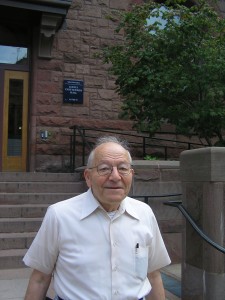It was October 1961 when Herb Winer arrived for his appointment in the basement of Linsly-Chittenden Hall. We know the rest: Williams greeted him, and soon a second man arrived — an ordinary-looking fellow who appeared to have come from an office job — and the experiment began.
Herb was in one of the conditions that featured the learner’s complaint about a problem with his heart. Just after the learner was strapped into his chair, he mentioned that he’d had treatment for a heart condition and asked if he should be worried about the shocks. The experimenter gave his scripted, dismissive reply that while the shocks might be painful, they weren’t dangerous.
When Williams showed Herb how the machine worked, giving him a sample shock of 45 volts, (‘an unpleasant sensation’, he said), he realised for the first time that he would be giving shocks to the learner. ‘As a younger man, I had done a little electrical work, house wiring and that sort of thing, so I knew what a 120-volt shock felt like and it was very, very serious. So when I saw this 450 level and “extremely dangerous”, I thought, indeed it is.’
It was an extraordinarily credible piece of fakery…
Yet when Herb described the machine to me, admiration crept into his voice. ‘It was an extraordinarily credible piece of fakery. It was made in Waltham, Massachusetts, and Waltham was renowned for its scientific instrument manufacturers. There was a gentle click, as you would expect on a toggle switch, and the light went on above the toggle switch when you pressed it to indicate that indeed the voltage had been delivered at the designated level. That was just part of the setting that Stanley created. I guess he might have had some help, but the blinding imagination that he showed in some of his other, later experiments seemed to be reflected from the very start.’
It disconcerted me, this switch that Herb made from subject to fellow academic, from emotional to clinical. It was not clear to me how or why he had made this adjustment. I didn’t know how he could move so easily from one emotion to another, almost as if he was flicking a switch within his own mind.
The memory test began and ‘it became quite obvious that he was a very dim-witted learner’. Herb realised that it was going to involve giving more than just one or two shocks.
Every time the learner got an answer right, Herb felt a wave of relief. But then he’d get one wrong, and then another. The voltage started to rise very rapidly. After the fourth or fifth shock, to his dismay Herb heard the learner cry out in pain. He told Williams that he didn’t want to hurt the man, but Williams urged him to continue. ‘The experimenter standing above me was instructing me very seriously that I had to go on.’
The pressure was unbelievably intense…
As the wrong answers multiplied and the voltages increased, the learner’s protests became louder. ‘I could hear him, his cries of pain and requests — “stop this”, “cut it out”, “this hurts”, and similar expressions.’
Herb was feeling increasingly agitated, but each time he protested that the learner was getting hurt, the experimenter responded with phrases like ‘you must continue’ or ‘the experiment requires that you continue’ or ‘you have no choice’. ‘The pressure was unbelievably intense. The thing that bothered me the most was that I could feel my heart rate increasing, and I was under very severe stress, and I finally realised that my stress, however it might bother me, could hardly compare with the pain and stress I was inflicting on the learner. I finally screwed my courage to the sticking place and quit. I said, “That’s it, I can’t continue.”’
I’d like to think it wasn’t much over 120 or so…
Herb said that it might have been the learner’s cries to stop that finally forced him to dig in his heels and refuse to go on, but he doesn’t remember. In fact, he doesn’t remember at exactly what voltage he stopped. ‘I blocked that out of my memory. I’d like to think it wasn’t much over 120 or so.’ He’s certain he stopped before the maximum voltage because ‘if I’d ever have gone all the way to 450 volts, we wouldn’t be talking now. I would keep this a secret. I wouldn’t want to talk about it.’
It was a point that Herb would return to each time I met him: that he didn’t remember the voltage at which he stopped, and we won’t know until all the subject files, including his, are made public in 2039. He worried at it, like a stone in a shoe. I wondered if perhaps he didn’t want to remember.
I was very angry…
What he did remember vividly was how wound up he felt afterward. Any soothing words or explanations of the experiment were ineffectual; they did nothing to alleviate his mounting outrage. ‘I took the four dollars and fifty cents — I had no compunction about that — then I went back to my office in Sage Hall, about half a mile away, on Prospect Street, and I looked him up in the faculty phone directory. I was ready to call Yale’s president if Milgram hadn’t been in the phone directory. I then phoned assistant professor Stanley Milgram — I felt that I had no reason to grovel before him because I was an assistant professor and he had no rank above me — and I told him that I wanted to see him at his earliest convenience because I’d just been a participant in his so-called memory study and I was very angry and concerned about it.’
Extract taken from:
Behind the Shock Machine: The Untold Story of the Notorious Milgram Psychology Experiments
Buy the book


